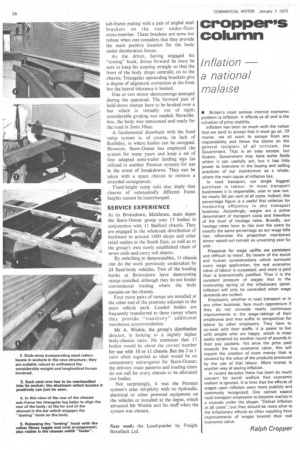cropper's column
Page 36

If you've noticed an error in this article please click here to report it so we can fix it.
Inflation a national malaise
• Britain's most serious internal economic problem is inflation. It affects us all and is the ruination of price stability.
Inflation has been so much with the nation that we tend to accept that it must go on. Of course, we all want to escape from any responsibility and throw the blame on the general recipient of all criticism, the Government. That is an easy escape, but illusory. Government may have some fields where it can usefully act, but it has little power to intervene in the buying and selling practices of our countrymen as a whole, where the main cause of inflation lies, In road transport, our single biggest purchase is labour. In most transport businesses it is responsible, year in year out, for nearly 50 per cent of all costs. Indeed, this percentage figure is a useful first criterion for . measuring efficiency in any transport business. Accordingly, wages are a prime determinant of transport costs and therefore of the level of haulage rates. Broadly, our haulage rates have to rise over the years by exactly the same percentage as our wage bills rise; otherwise the proportion mentioned above would not remain so unvarying year by year,
Pressures for wage uplifts are persistent and difficult to resist. By reason of the social and human considerations which surround every wage application, the real economic value of labour is surpassed, and more is paid than is economically justified. Thus it is the constant pressure of wages that is the motivating spring of the inflationary spiral. Inflation' will only be controlled when wage demands are curbed.
Employers, whether in road transport or in any other business, face much opprobrium if they do not concede nearly continuous improvements in the wage-takings of their employees and may suffer in competition for labour by other employers. They have to co-exist with their staffs; it is easier to live with people who are happy, which is most easily obtained by another round of pounds in their pay packets. Yet once the price paid exceeds the true economic value, this will require the creation of more money than is covered by the value of the products produced by the use of that labour. More money is another way of saying inflation.
In recent decades there has been so much concern for social welfare that economic realism is ignored. It is time that the effects of wages upon inflation were more publicly and commonly recognized. One cannot expect road transport employers to become martys in a crusade under the slogan "Defeat inflation at all costs"; but they should be more alive to the inflationary effects so often resulting from improvements of wages beyond their real economic value.
Ralph Cropper




















































































